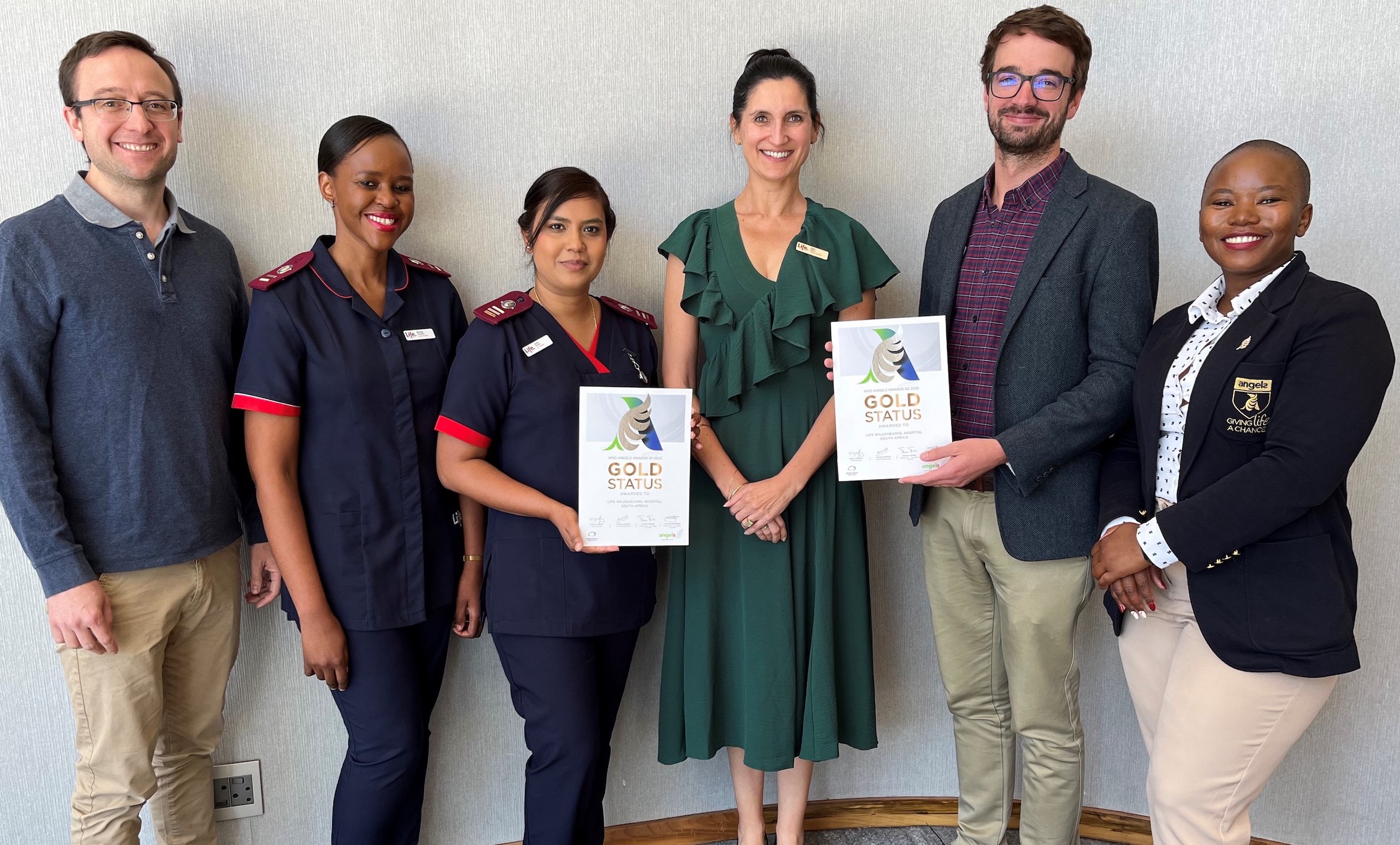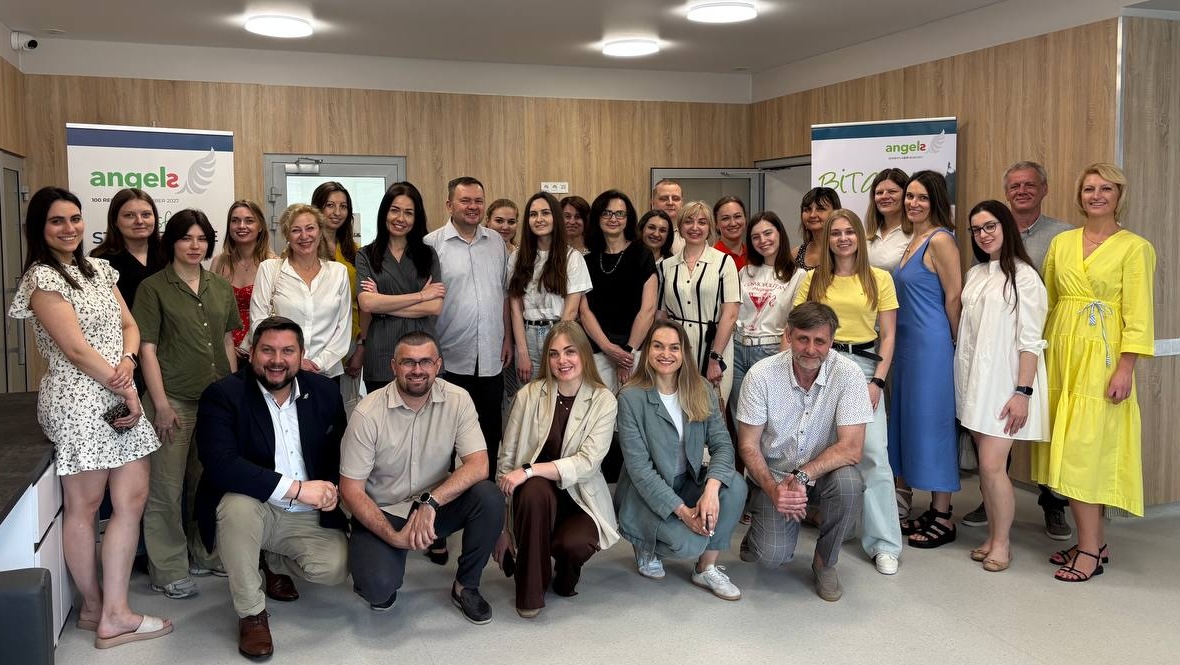
ในเช้าวันเสาร์ 10 ธันวาคม 2565 เมือง Sister Lindiwe mhakamuni Nyambi กําลังมุ่งหน้าสู่เมืองแซนตัน เมืองนี้ขึ้นชื่อว่าเป็นจตุรัสไมล์ที่ร่ํารวยที่สุดของแอฟริกา ศูนย์การประชุมแซนด์ตันตั้งอยู่ถัดจากจัตุรัสเนลสันแมนเดลา ซึ่งมีรูปปั้นบรอนซ์สูงหกเมตรของประธานาธิบดีประชาธิปไตยคนแรกของประเทศ ยังเป็นจุดหมายปลายทางที่ทันสมัยที่สุดในโจฮันเนสเบิร์ก
แต่ Sr Lindiเราไม่ไปช็อปปิ้ง เธอเข้าร่วมกับแพทย์และพยาบาลกว่า 100 คนจากทั่วแอฟริกาใต้เพื่อประชุมเกี่ยวกับโรคหลอดเลือดสมองเป็นเวลาสองวัน เธอเป็นคนแรกที่ประกาศว่า ‘ฉันกําลังจะทํา’ เมื่อคําเชิญเข้าร่วมวัน Angels Day มาถึงโรงพยาบาล Life Wilgeheuwel ซึ่งเป็นโรงพยาบาลเอกชนที่ให้บริการประชากรผู้สูงอายุในเมืองโรเดปอร์ตบนถนนเวสต์แรนด์ในโจฮันเนสเบิร์ก
นอกจากนี้ ยังมุ่งหน้าไปที่ Sandton เพื่อนร่วมงานของเธอในแผนกฉุกเฉิน Sr Christine Zikalala นอกจากการทํางานร่วมกันแล้ว พยาบาลเหล่านี้ยังมีสิ่งอื่นที่เหมือนกัน คุณปู่ของคริสตินเป็นโรคหลอดเลือดสมองตีบอายุ 72 ปี และเพิ่งค้นพบในวันต่อมา เมื่อลินดิเว่อยู่ในโรงเรียนมัธยม พ่อเลี้ยงของเธอเป็นโรคหลอดเลือดสมองและเสียชีวิตหนึ่งเดือนหลังจากออกจากโรงพยาบาล พวกเขาทั้งคู่สูญเสียคนที่คุณรักไปเพราะโรคหลอดเลือดสมองตีบเป็นส่วนหนึ่งของเหตุผลที่พวกเขาอยู่ในภารกิจเช้าวันเสาร์นี้
นอกจากนี้ ระหว่างทางไปแซนด์ตันคือ ดร.เฟรเดอริค (ริคโก) รอสเซาว์ แพทย์ฉุกเฉินที่โรงพยาบาลไลฟ์วิลเกเฮอเวล ทีมโรงพยาบาลตั้งตาคอยที่จะเชี่ยวชาญในการปรับเส้นทางโรคหลอดเลือดสมองให้เหมาะสมและการตัดสินใจในโรคหลอดเลือดสมองเฉียบพลัน หลังจากพักดื่มกาแฟ กลุ่มจะแบ่งออก และในขณะที่ดร. Ricko เข้าร่วมมาสเตอร์คลาสในการถ่ายภาพโรคหลอดเลือดสมองเฉียบพลัน Christine และ Lindiwe จะเข้าร่วมเวิร์คช็อปเกี่ยวกับการดูแลพยาบาลในระยะเฉียบพลันและหลังระยะเฉียบพลัน
วิทยากรในวันอาทิตย์ ได้แก่ ดร.หลุยส์ โครน จากโรงพยาบาล Steve Biko Academic ซึ่งเป็นโรงพยาบาลแห่งแรกในแอฟริกาใต้ที่ได้รับรางวัลเพชร WSO Angels และดร. De Vries Basson จากโรงพยาบาล Karl Bremer ซึ่งเป็นสถานบริการอีกแห่งหนึ่งของรัฐที่ให้การดูแลผู้ป่วยโรคหลอดเลือดสมองที่เป็นแบบอย่างแก่ประชากรที่มีความเสี่ยงสูง
มหัศจรรย์เกี่ยวกับการเติบโตและการเรียนรู้
วันหยุดสุดสัปดาห์ทําให้เกิดการทบทวนการเดินทางของผู้ป่วยโรคหลอดเลือดสมองของโรงพยาบาล Life Wilgeheuwel สิ่งสําคัญคือการบันทึกข้อมูลโรคหลอดเลือดสมองที่มีคุณค่าเป็นผลมาจากโรงพยาบาลเก็บข้อมูลผู้ป่วยในฐานข้อมูลการพัฒนาการดูแลผู้ป่วยโรคหลอดเลือดสมอง RES-Q พวกเขาได้รับรางวัล WSO Angels Awards ติดต่อกันสองครั้ง
เธอรู้สึกกระฉับกระเฉง ศ. Judy Naidoo ซึ่งเป็นผู้จัดการหน่วยฉุกเฉินของโรงพยาบาล Life Wilgeheuwel ได้เป็นผู้นําที่รอบคอบให้กับทีมพยาบาลหน่วยฉุกเฉิน เธอบอกรับเอารูปแบบความเป็นผู้นําเชิงปฏิรูปที่ได้มาจากมุมมองของผู้นําของ Robin S Sharma นักเขียนชาวแคนาดาเกี่ยวกับความสัมพันธ์และอิทธิพล “ฉันเชื่อมั่นในการมอบอํานาจของทีม ยิ่งทีมของฉันได้รับการมอบอํานาจมากเท่าไหร่ การมีส่วนร่วมของพวกเขาก็ยิ่งมากขึ้นเท่านั้น ซึ่งทําให้บรรลุเป้าหมายได้”
Srs Lindiwe และ Christine ได้รับเลือกให้เข้าร่วม Angels Day เพราะพวกเขา "เป็นประหลาดเกี่ยวกับการเติบโตและการเรียนรู้" แต่เพราะการได้สัมผัสกับผลกระทบของโรคหลอดเลือดสมองด้วยมือข้างแรกทําให้เข้าใจอย่างลึกซึ้งยิ่งขึ้น Sr Judy เชื่อ เธอสูญเสียทั้งปู่ของเธอเมื่อเธอยังเด็กเกินไปที่จะรู้จักพวกเขา แต่สมาชิกในครอบครัวที่ใกล้ชิดเข้ามาแทนที่ - "บุคคลในเชิงบวก มีความสุข มีชีวิตชีวา และกระตือรือร้น" ซึ่งหลังจากนั้นก็สูญเสียความเป็นอิสระของเขาหลังจากเกิดโรคหลอดเลือดสมอง แม้ว่าเขาจะพิการ แต่ชีวิตของเขายังคงเป็นแรงบันดาลใจ และมรดกสืบทอดของเขาก็ช่วยขับเคลื่อนแรงผลักดันของเธอในการป้องกันผลที่ตามมาที่ร้ายแรงของโรคหลอดเลือดสมองด้วยการสอน การฝึกอบรม และการมอบอํานาจ
เรารู้ว่าต้องทําอะไรเพื่อปรับปรุง
ดร. Michael Waldeck หน่วยฉุกเฉินของโรงพยาบาล Wilgeheuwel เริ่มต้นทุกวันด้วยการสวดมนต์เจ้าหน้าที่และผู้ป่วยของเขา มุ่งมั่นอย่างยิ่งที่จะเสนอการดูแลที่ดีที่สุดเท่าที่เป็นไปได้และส่งมอบผลลัพธ์ที่ดีที่สุดที่เป็นไปได้สําหรับผู้ป่วยของเขา โรงพยาบาล Hejoined Life Wilgeheuwel ในเดือนมีนาคม 2019 และดร. Ricko เข้าร่วมสามเดือนต่อมา ไม่น่าแปลกใจที่นั่นเป็นปีที่พวกเขาเริ่มแนะนําระเบียบวิธีของแองเจิลในการรักษาผู้ป่วยโรคหลอดเลือดสมองเฉียบพลัน การดูแลผู้ป่วยโรคหลอดเลือดสมองของพวกเขาอย่างรอบคอบเหมือนกับคนอื่น ๆ ทั้งหมด และยินดีต้อนรับการสนับสนุนของ Angels Initiative ในฐานะจิตวิญญาณที่มีน้ําใจที่แบ่งปันความปรารถนาของพวกเขาที่จะสร้างความแตกต่างเชิงบวกให้กับชีวิตของผู้คน
อย่างไรก็ตาม หลังจากวัน Angels Day เรื่องราวใหม่ได้เผยสู่การดูแลผู้ป่วยโรคหลอดเลือดสมองที่โรงพยาบาลแห่งนี้
“วันAngels Day เป็นปรากฏการณ์สําหรับฉัน” ดร. Ricko ที่มีความสนใจในโรคหลอดเลือดสมองเช่นเดียวกับเพื่อนร่วมงานพยาบาลของเขากล่าว เขาอายุเพียงสี่ขวบเมื่อยายของบิดาถูกทิ้งตัวด้วยโรคหลอดเลือดสมองรุนแรง แต่เมื่อเธอเสียชีวิตห้าปีต่อมาเขาก็แก่พอที่จะตระหนักถึงผลกระทบต่อพ่อและลุงของเขา
เขากล่าวว่า “เป็นเรื่องดีที่เราสามารถคืนชีวิตของพวกเขาให้กับใครบางคนได้ ดังนั้นพวกเขาจึงมีเวลามากขึ้นในการอยู่กับครอบครัวของพวกเขา โอกาสที่จะได้เป็นสมาชิกที่มีประสิทธิภาพของสังคม นั่นคือสิ่งที่ขับเคลื่อนฉันและคนอื่น ๆ ในทีม
“หลังจากได้ยินเรื่องราวความสําเร็จจาก Steve Biko และ Karl Bremer ฉันรู้สึกได้รับแรงบันดาลใจ ฉันคิดว่าถ้าพวกเขาสามารถทําเช่นนี้ได้เราก็สามารถทําได้ เรารู้ว่าเราต้องทําอะไร”
ด้วยแนวคิดที่ว่า คุณไม่สามารถปรับปรุงสิ่งที่คุณไม่ได้วัดได้ ขั้นตอนแรกของเขาคือการเก็บข้อมูลผู้ป่วยโรคหลอดเลือดสมองจากเดือนก่อน เมื่อพวกเขารู้ว่าพวกเขาอยู่ที่ไหนพวกเขาสามารถไปถึงจุดที่ต้องการ
“ข้อมูลหมายความว่าฉันสามารถทําให้มันเป็นรูปธรรมสําหรับแพทย์และพยาบาล” ดร. Ricko กล่าว “แทนที่จะบอกว่าเราต้องปรับปรุง ผมสามารถกําหนดเป้าหมายและผลลัพธ์ที่วัดได้จากข้อมูลจริง ผมยังสามารถนําข้อมูลนี้ไปใช้กับแผนกรังสีวิทยา และอธิบายว่าเพื่อให้ตัวเลขของเราลดลง เราต้องทํางานด้วยความรู้สึกเร่งด่วนเมื่อเคลื่อนย้ายผู้ป่วยระหว่างหน่วยถ่ายภาพและหน่วยฉุกเฉิน”
นอกจากนี้ ความรู้สึกเร่งด่วนยังส่งผลกระทบต่อแชมป์โรคหลอดเลือดสมองใหม่สองรายที่การประชุมมีอํานาจและมีแรงจูงใจ “ฉันเรียนรู้ว่าฉันต้องเป็นผู้สนับสนุนโรคหลอดเลือดสมองในหน่วยฉุกเฉินและต้องแน่ใจว่ามีการรักษาเส้นทางโรคหลอดเลือดสมอง” Sr Christine กล่าว เช่นเดียวกับการติดตาม การบันทึก และการตอบสนองต่อความต้องการทางคลินิกของผู้ป่วย พยาบาลเป็นสัญญาณเตือนสําหรับรหัสโรคหลอดเลือดสมอง รับผิดชอบในการส่งการแจ้งเตือนตลอดเส้นทาง ตั้งแต่ประสาทวิทยาไปจนถึงรังสีวิทยาและห้องปฏิบัติการ
การฝึกอบรมเพื่อนร่วมงานที่พยาบาลของพวกเขาเป็นส่วนหนึ่งของบทสรุป ดังนั้นเมื่อผู้ป่วยโรคหลอดเลือดสมองมาถึง ทุกคน ไม่ว่าจะในกรณีฉุกเฉินหรือจากการคัดแยก รู้ว่าต้องทําอย่างไรและจะปฏิบัติตามระเบียบวิธีโรคหลอดเลือดสมองอย่างไร เมื่อ Sr Lindiwe กลับบ้านในวันคริสต์มาสนั้น เธอเอาข้อบังคับการฝึกอบรมของเธอติดตัวไปด้วย ในจังหวัดลิมโปโป้ในชนบทซึ่งแม่และยายของเธออาศัยอยู่ รถพยาบาลอาจใช้เวลาหลายชั่วโมงกว่าจะมาถึงหากพวกเขามาถึง “ฉันบอกพวกเขาว่า หากคุณเห็นอาการของโรคหลอดเลือดสมอง อย่ารอให้รถพยาบาลพาคุณไปที่โรงพยาบาล ให้นั่งรถ”
อาวุธลับในแผนกธุรการ
ภาคภูมิใจในความสําเร็จล่าสุดของพวกเขา รางวัลระดับโกลด์ไม่ได้สะท้อนถึงความทะเยอทะยานของทีมโรงพยาบาล Life Wilgeheuvel ในการประชุมทีมสหสาขาวิชาชีพครั้งล่าสุด พวกเขาจัดสรรเวลาเพื่อศึกษาเกณฑ์สําหรับสถานะแพลตินัมและเพชร และวางแผนเพื่อไปให้ถึงจุดนั้น ดร. Waldeck กล่าวว่า “ในฐานะทีม เราได้ตั้งเป้าหมายให้ตัวเอง เรายินดีที่ได้เหรียญทองมา แต่เรายังไม่ถึงยอดเขา” แผนของพวกเขารวมถึงการรักษาผู้ป่วยมากขึ้นที่ CT การเร่งการถ่ายโอนไปยังศูนย์ที่ครอบคลุมสําหรับการลากลิ่มเลือด และเพิ่มการรับรู้ของสาธารณะเพื่อให้ผู้ป่วยมากขึ้นมาถึงภายในกรอบเวลาการรักษา
ทีมได้รับการสนับสนุนจากความมุ่งมั่นอย่างแรงกล้าของดร. Comfort Shaba นักประสาทวิทยา และการรับสมัครล่าสุดดร. Zahraa Khotu ที่ประกาศตัวเองว่า “เข้าร่วมกับโครงการโรคหลอดเลือดสมอง Angels” เธอดึง “ความหลงใหลและแรงจูงใจ” ของดร. Ricko ออกมาเป็นแรงผลักดันที่อยู่เบื้องหลังความสําเร็จของทีม "เขากระตือรือร้นและมีประสิทธิผลอย่างมาก" เธอกล่าว หลังจากหกปีในยาฉุกเฉิน ดร. Khotu คุ้นเคยกับความเสียหายของโรคหลอดเลือดสมองและผลกระทบต่อครอบครัว เธอบอกว่า “นี่อาจเป็นโรคหลอดเลือดสมองตีบอันดับร้อยของเรา แต่สําหรับผู้ป่วยและครอบครัวของพวกเขามันเป็นโรคหลอดเลือดสมองตีบแรก”
ในที่สุดก็มีอาวุธลับของพวกเขาในฝ่ายปกครอง Tina Cilliers ซึ่งการเก็บบันทึกข้อมูลอย่างพิถีพิถันเป็นสิ่งสําคัญสําหรับข้อมูลที่บันทึก
"การบริหารจัดการและการเก็บบันทึกสามารถมีบทบาทในการปรับปรุงระบบได้อย่างแท้จริง" เธอกล่าว “มันมักจะถูกมองข้าม แต่มันเป็นรากฐานที่สําคัญของธุรกิจใดก็ตาม”
การติดตามข้อมูลจะยิ่งมีความสําคัญมากขึ้น หาก “ธุรกิจ” ของคุณรักษาชีวิตเอาไว้



